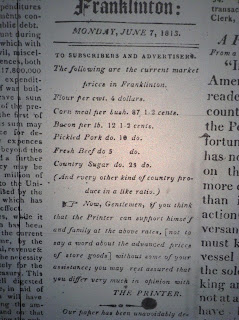 |
| Is that musician wearing flip flops? |
Yesterday I spent a good two hours in the basement of the
Worthington Public Library going through a microfilm reel from the Franklinton, Ohio
Freeman's Chronicle published between 1812 and 1814. It's the same paper from which I posted a
selection of classified ads two years ago. Although I didn't find many new things, I was able to immerse myself in the world of a frontier town two hundred years ago. There were some familiar names, like Goodale, along with many others whose names have passed from public memory. In 1812 Franklinton was still a frontier village--but the number of brick houses, taverns, shops, and the handsome courthouse belie the image of a crude settlement made up of log cabins (but there were certainly plenty of those). Even during the height of the British blockade in 1813 and 14 you could still get a number of luxury items, including Chinese tea and Caribbean coffee. The state capital of Chillicothe was a few miles south, and the future capital city--Columbus-- was a sparsely settled rise of land called Wolf Ridge overlooking Franklinton from across the Scioto River.
What was most interesting was how connected the residents of the town were. News articles in the
Chronicle were copied freely from other papers-- an early form of syndication or even aggregation like the Huffington Post. Irregular mail pouches from other towns brought the news of the world. What a time it was! Not only was the endgame of the great world conflict known as the Napoleonic Wars playing out in Europe, but news came from Turkey of the Russo-Turkish war, in Texas a group of American adventurers had invaded the Mexican state and captured San Antonio-- while other filibusters were taking control of Spanish Florida, Algiers was taking advantage of the wars to raid American shipping, and pirates infested the seas. Here are some selections of news and ads from those years:
A Card.
Mr. Huntington most respectfully acqaints the Ladies and Gentlemen of Fraklinton that, at the Court House this evening, he will have the honor to offer them one of the Entertainments he has recently exhibited in some of the principle Towns in the United States.
In the course of the evening Mr. H will deliver some "Hints to those designed for a military life," & introduce a number of patriotic effusions breathing as nearly as possible the spirit of the times, and several pieces of satire on the English officers and government.
To commence at 7 o'clock.
Tickets (50 cents) to be had at Mr. Brodrick's Bar.
October 20.
Handle--Cash!
Notice is hereby given, for the last time, to all persons indebted to the subscriber, either by note or book account, to come forward immediately, and settle the same, as longer indulgence cannot nor will be given.
My iron's good, my work is just,
Times are so hard I cannot trust;
Therefore to save both suit & sorrow.
Pay to-day, and I'll trust to-morrow.
George Skidmore
October 24, 1813.
"Deserted"
"When he went away he had on brown clouded linsey clothes, and a white hat, pretty well worn. Whoever will apprehend the said Hall, and deliver him to any military officer in the service of the United States, so that he is brought to Head-Quarters, or delivered to the subscriber, shall receive 10 dollars reward, with all reasonable charges."
John M'Wharter
Capt. 1st Regt.
Nov. 4, 1813.
The Election for President & Vice-President of the United States, has terminated in favour of Madison and Gerry. Clinton had 89 votes for President, and Ingersol 86 (?) for Vice-President.
Congress are doing--nothing.
Dr. Eustis, alias Useless, has resigned (from being the Secretary of War). Rumor is busy respecting his successor. Armstrong, the author of the famous letter exciting the revolutionary army to mutinize against Gen. Washington (the Conway Cabal affair), will probably be appointed.
The Hon. Secretary of the Navy tipples as much as ever.
The heroic Gen. Smyth has immortalized himself by-----running away.
Gen. Dearborn has concluded not to invade Canada till a "more convenient season".
A Proclamation
WHEREAS an evil ill disposed Frigate known by the name of the AMERICAN CONSTITUTION ...being instigated by one ISAAC HULL, and not having the fear of our good ship the GUERRIERE... did with malice afore-thought and evil intent, on the King's high Sea,
commit assault and Battery on the aforesaid ship... and after having overcome her in single combat, did send her to a place known to mariners by the name of
Davy Jones' Locker...
AND WHEREAS we have reason to fear that none of our Royal frigates are able to cope with the aforementioned frigate called the Constitution, we, therefore, ...are pleased to make known to the captain of all our frigates on the American station, that, the less they have to do with the American Constitution, the better for themselves--and if they have to consult their safety by flight, no disgrace will be attached to them.
General James Wilkinson was in fact a Spanish secret agent... but I didn't know that was so widely known at the time!
In 1813, with wartime scarcity and inflation, 100 pounds of wheat flour was $57.14 in today's money (according to a dodgy online calculator). $12 was the average monthly wage of a laborer.



















